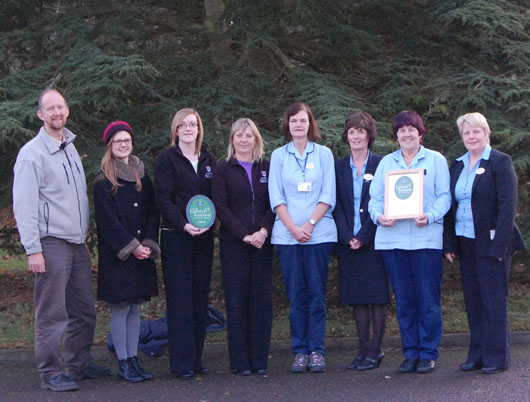Top green awards for student halls

Two of the newest student residences at the University of St Andrews have been rewarded for their green credentials.
For the third year running, the University’s New Hall and David Russell Apartments (DRA) have been awarded Gold Awards from the Green Tourism Business Scheme (GTBS). The halls of residence scored 89% and 90% respectively putting both in the running for the GTBS annual Best Performer Award.
The Green Tourism Business Scheme is a national sustainable tourism certificate that is a Visit Scotland venture; it recognises exemplary environmental management, infrastructure, energy and water consumption, engagement and attention to natural and cultural heritage.
The Gold Awards for New Hall and DRA also recognises campus wide measures that are being taken to decrease environmental impact. Both halls of residence scored particularly high on energy saving through a combination of behaviour change projects such as the Inter-Hall Energy Competition, solar panels at both location to heat water, and the planned large scale projects of a six-turbine wind farm at Kenly and energy centre at the old Guardbridge paper mill.
Speaking after the announcement, Roger Smith, Director of Residential Business Services said: “At a time of increased pressure on financial and staffing resources this achievement is a credit to the wide range of staff who are committed to maintaining this gold standard of environmental performance.”
The Gold GTBS awards add to the growing list of prestigious environmental awards that the University of St Andrews has won this year: the 1st Class People and Planet Green League 2011 award was presented in January, as well as funding from the Climate Challenge Fund for Transition University of St Andrews, (TUSA).
Transition University of St Andrews is part of the UK-based Transition initiative which was launched at the University in 2009 by a group of students. Both academic and non-academic staff are involved and work within the University at a grass roots level running reduction projects in response to the threats of climate change and peak oil. Through working on practical projects, the initiative helps communities minimise their impact on the planet, become more self-sustaining, and strengthens community ties.
ENDS
Issued by the University of St Andrews Press Office
Please contact Victoria Herd, 01334 462530 / [email protected]
View the latest news release at www.st-andrews.ac.uk/news
Ref (GTBS 21/12/11)
Category Awards